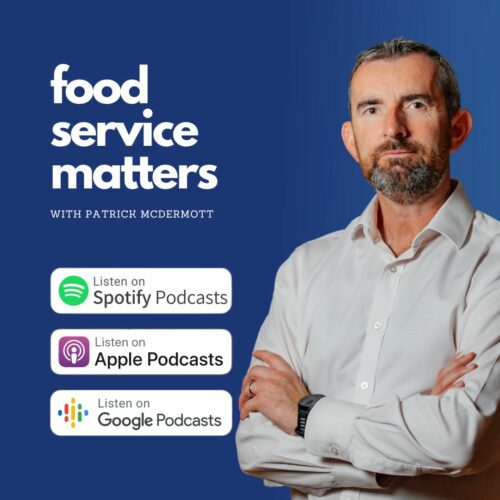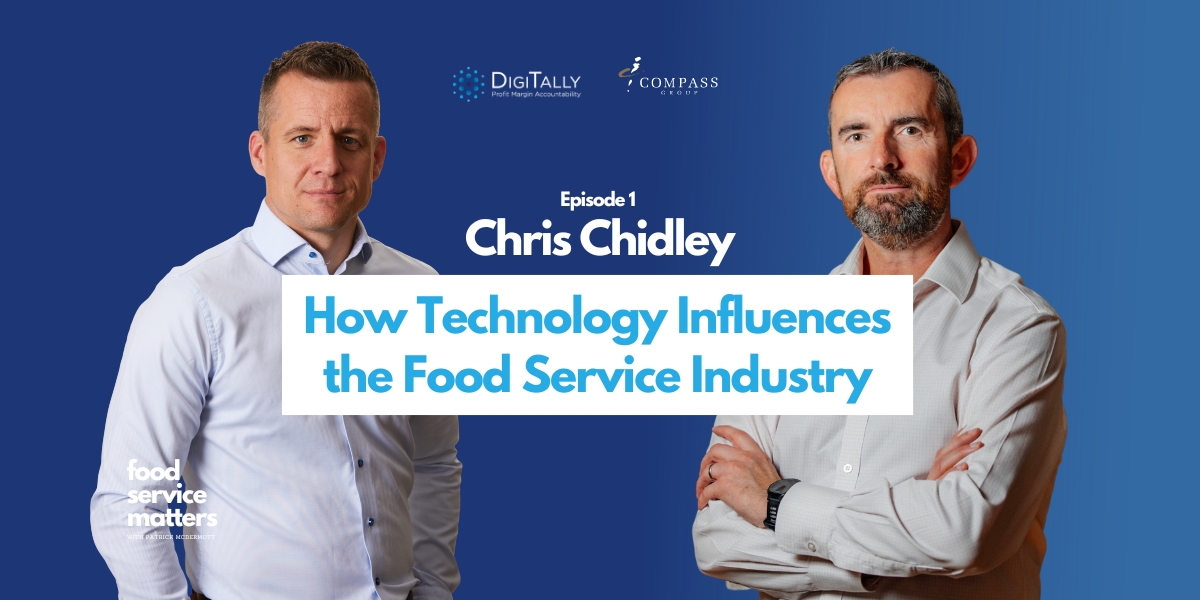When dining out, we tend to follow traditions that predate modern technology despite our present reality being very different.
In fact, nowadays, the food service industry contributes over £100 billion to the UK economy each year and employs over 3 million people. However, at the same time, current challenges – including staff shortages and rising food and fuel prices – are forcing 12 food establishments to close across the country every day.
For many companies in these difficult times, technology has proved itself a central tool in the battle to survive.
In the first episode of the new Food Service Matters podcast, Patrick McDermott talks with Chris Chidley, Chief Growth Officer of Compass Group, the largest food service company in Europe. They discuss the crucial role tech plays in the food and beverage sector, specifically how back-of-house technologies, such as data analytics and inventory management systems, have become crucial food service tools in recent years.
COVID and Front-of-House Technology
The COVID-19 pandemic had a major impact on the food service industry in the UK. To keep afloat, restaurants had to adapt their operations and adopt new technologies.
“The acceleration of technology during COVID is well documented. Front-of-house technology got a real quick revamp: kiosk, pre-order, pre-pay applications on your mobile, and so on. That became the forefront of what we were doing,” Chris explains.
“Interestingly, we’re starting to see a bit of a shift of attention towards back-of-house data now. The question is, why? If you look at the landscape, you’ve got food inflation, labour inflation, increased energy costs… and so you’ve also got a record number of pubs and restaurants closing.”
Post-COVID and Back-of-House Technology
Back-of-house technologies are therefore helping restaurants improve their efficiency and profitability, particularly through data analysis and stock management.
Data analytics enables restaurants to track their sales and identify trends, information that they can then use to make better decisions. In addition, inventory management systems help restaurants track their stock levels and ensure they have the right amount of food on hand to reduce food waste and improve profitability.
“Back-of-house data is playing a critical part because our partners are looking for data to inform them, for example, of the right times to open or the right days to operate,” explains Chris. “It is helping us support our teams on the front line, so, for example, where chefs perhaps were working 40 hours over five days, the data suggested working the same number of hours but over four days instead. The chef community is enjoying the outcome because they have three days off now instead of two. We are really happy because we don’t have to make people changes, and overall motivation and energy levels have increased nicely. So, we’re seeing some good shifts based on technology by moving towards back-of-house data.”
Chris says to Patrick, who runs the stocktaking app DigiTally, “You’ve seen this first-hand via the support you’ve given us through your products. For example, you can provide data that suggests some efficiencies can be made in these particular areas in the kitchen. That can then support the overall cost demands and contribute to food sustainability and environmental impact.”
Patrick adds, “Decisions driven by data are more educated or based on fact – and are better for your team. Plus, you’re going to be serving your customers more efficiently.”
What’s the Future of Food Service Technology?
“There are 180,000 vacancies in our sector,” points out Chris, “and when you speak to food service industry leaders in the marketplace, they will tell you that it’s going to be very hard to fill those vacancies. Tech plays a role in bridging the gap between your current operation and those vacancies, so an easy one to call out would be robotics. For example, the introduction of host and hostess robots or cleaning machines. These are easy fixes to what could be a vacancy that you’re unlikely to fill.”
He suggests that these tough times are something for the industry to relish as a stimulus to break new ground. “Tech will continue to play a big role in the future. Innovation is critical to overcoming the challenges in staffing and the increasing cost pressures in energy, labour and food.”
To listen to Patrick’s full interview with Chris, check out the Food Service Matters podcast on Spotify, Apple Podcasts or Google Podcasts.

Patrick is CEO of stocktaking app DigiTally, which is playing an increasingly important role as an intuitive and interconnected stock management system that keeps your food service business up to date and helps combat food waste. Keen to learn more? Let’s chat! Book a 30-minute call with Patrick and get your demo set up today.



